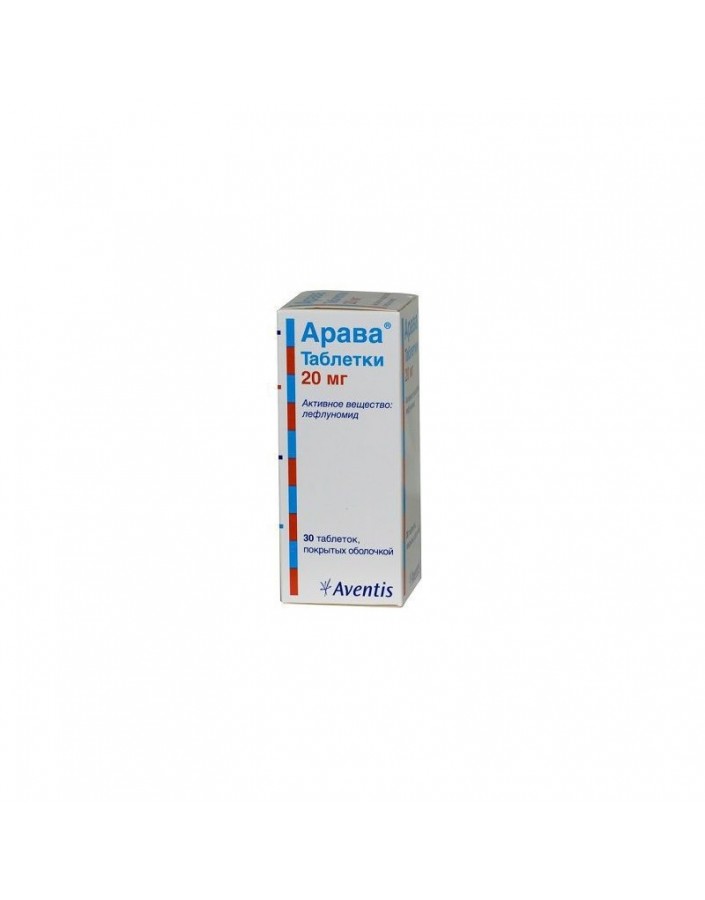



ARAVA PILLS COATED 20MG - 30TABS

Security policy (edit with Customer reassurance module)

Delivery policy (edit with Customer reassurance module)

Return policy (edit with Customer reassurance module)
Coated Tablets
Active substance: Leflunomide 20 mg.
30 pieces
Arava is a basic antirheumatic drug. It has antiproliferative, immunomodulatory, immunosuppressive and anti-inflammatory properties.
The active metabolite of leflunomide A771726 inhibits the enzyme dehydroorotat dehydrogenase and has antiproliferative activity. In vitro, A771726 inhibits mitogen-induced proliferation and DNA synthesis of T-lymphocytes. The antiproliferative activity of A771726 appears, apparently, at the level of pyrimidine biosynthesis, since the addition of uridine to the cell culture eliminates the inhibitory effect of metabolite A771726. Using radioisotope ligands, it has been shown that A771726 selectively binds to the enzyme dehydroorotate dehydrogenase, which explains its ability to inhibit this enzyme and the proliferation of lymphocytes at the G1 stage. Lymphocyte proliferation is one of the key stages in the development of rheumatoid arthritis.
At the same time, A771726 inhibits the expression of receptors for interleukin-2 (CB-25) and Ki-67 and PCNA core antigens associated with the cell cycle.
The therapeutic effect of leflunomide has been shown in several experimental models of autoimmunediseases, including rheumatoid arthritis.
Leflunomide reduces symptoms and slows the progression of joint damage in the active form of rheumatoid arthritis.
The therapeutic effect usually appears after 4-6 weeks and may increase further over 4-6 months.
As a basic tool for the treatment of adult patients with the active form of rheumatoid arthritis in order to reduce the symptoms of the disease and delay the development of structural damage to the joints.
The active form of psoriatic arthritis.
Arava is contraindicated in women of childbearing age who do not use adequate contraception.
Men receiving treatment with leflunomide should be warned about the possible fetotoksicheskogo effects of the drug and the need to use adequate contraception.
The use of Arava should begin under the supervision of a physician experienced in the treatment of rheumatoid and psoriatic arthritis.
Treatment begins with the appointment of a loading dose of 100 mg daily for 3 days. As a maintenance dose in rheumatoid arthritis, a dose of 10 to 20 mg is recommended 1 time per day; in psoriatic arthritis - 20 mg 1 time / day.
The therapeutic effect is manifested after 4-6 weeks from the start of the intake and may increase within 4-6 months. pills should be swallowed whole, washed down with a sufficient amount of liquid, regardless of the meal. Dose adjustment is not required for patients older than 65 years and in patients with mild renal insufficiency.
The classification of the expected frequency of side effects: typical - 1-10%, atypical - 0.1-1%, rare - 0.01-0.1%, very rare - 0.01% or less.
Cardiovascular: typical - moderate increase in blood pressure; rare - marked increase in blood pressure; very rare - vasculitis (due to the presence of the underlying disease, a causal relationship with taking leflunomide could not be established).
From the digestive system: typical - diarrhea, nausea, vomiting, anorexia, lesions of the oral mucosa (aphthous stomatitis, ulceration of the lips), abdominal pain, increased activity of hepatic transaminases (especially ALT), less often - GGT, ALP, hyperbilirubinemia; rare - hepatitis, jaundice, cholestasis; very rare - severe liver damage (liver failure, acute liver necrosis, which can be fatal), pancreatitis.
Respiratory: very rare - interstitial pulmonary process (including interstitial pneumonia) with a possible fatal outcome.
Metabolism: typical - weight loss, asthenia; atypical - hypokalemia.
Nervous system: typical - headache, dizziness, asthenia, paresthesia; atypical - a violation of taste, anxiety; very rare - peripheral neuropathy.
Musculoskeletal system: typical - tendovaginitis; atypical - tendon rupture.
Dermatologic: typical - enhanced hair loss, eczema, dry skin; very rare - erythema multiforme.
Allergic reactions: typical - mild allergic reactions, rash (including maculo-papular), itching; atypical - urticaria; very rare - Stevens-Johnson syndrome, Lyell's syndrome.
Hemic and lymphatic: typical - leukopenia (leukocytes more than 2000 / μl); atypical - anemia, thrombocytopenia (platelets less than 100 000 / μl); rare - eosinophilia, leukopenia (leukocytes less than 2000 / mcl), pancytopenia; very rare - agranulocytosis. The risk of hematological disorders increases with the recent, concomitant and subsequent use of myelotoxic drugs.
Other: very rare - the development of severe infections (including opportunistic) and sepsis; possible increase in the incidence of possible infections (rhinitis, bronchitis and pneumonia).
Store at a temperature not higher than 25 ° С.
3 years.